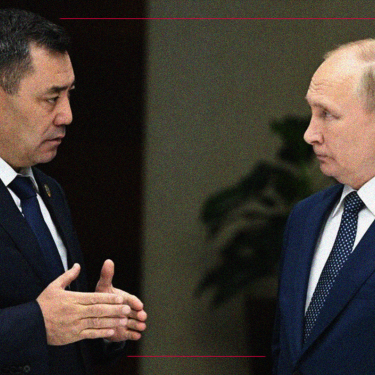Kyrgyzstan’s Japarov seeks Putin-style media legislation

Reporters Without Borders (RSF) calls on Kyrgyzstan’s parliament to reject a media law proposed by President Sadyr Japarov’s government that is based on Russian legislation and threatens the very existence of independent media in a country hitherto seen as an oasis of relative freedom in Central Asia.
Read in Russian / Читать на русском
Alarmed by the way that copies of draconian Russian laws have been spreading in former Soviet countries in recent months, RSF also urges Kyrgyzstan’s parliamentarians to reject a proposed NGO law that is directly based on a law used to harass media outlets in Russia.
Under the proposed media law – which the Kyrgyz parliament is due to vote on before the summer break and which is even more restrictive than four earlier drafts – all media outlets would have to register with the justice ministry or digital development ministry, and the government itself, via a complex procedure, would be able to approve or reject their registration requests.
Unregistered media would be regarded as illegal and would not be able to obtain accreditation. Vague references to “abuse of freedom of expression” and respect for “traditional moral values” would be open to varied interpretations and would also facilitate censorship.
The proposed NGO law, which parliament is scheduled to vote on at the same time as the media law, is based on Russia’s “foreign agents” law. It would restrict media coverage of NGO activities and would provide for criminal penalties of up to ten years in prison on a charge of “propaganda.”
“The epidemic of repressive laws spreading from a diseased Russia in recent months is now hitting Kyrgyzstan hard. If freedom of expression was President Japarov’s ‘absolute priority,’ as he again claimed on 5 May, he would not have proposed this new media law, which strengthens his control over the press. We call on parliament to reject this bill and the one on NGOs, which would push Kyrgyzstan into the camp of authoritarian regimes led by Vladimir Putin.
Kyrgyzstan’s independent media – the most developed and diverse in Central Asia – are facing an unprecedented danger. By expressing strong opposition, they obtained the creation of a working group on the bill that included journalists. But they were ultimately unsuccessful. The president’s office stuck to its guns and only a few token modifications were made.
“We can see that it will be impossible to work,” said Dina Maslova, the director of Kaktus.media, an independent news site. “Either you become a propaganda tool for the authorities and only quote official press releases from governmental agencies. Or, after every story you publish, you have to expect criminal proceedings or the cancellation of your media’s registration.”
The dramatic consequences of similar Russian-inspired legislation can already be seen in former Soviet countries such as Azerbaijan, where President Ilham Aliyev’s government has required all media and journalists to register with the authorities since the start of 2022. Around 40 media outlets have been denied registration, with the result that they now lack accreditation, their activities are regarded as illegal, and they are exposed to the possibility of judicial proceedings.
Other governments have been tempted by the Russian “foreign agents” law on which the Kyrgyz draft NGO law is based. They include Georgia’s, which finally withdrew its own proposed version in response to massive protests and international pressure.
As a result, some of Russia’s neighbours have been accompanying its precipitous fall in RSF’s Press Freedom Index. They include Kyrgyzstan, which plummeted 50 places in the 2023 Index and is now ranked 122nd out of 180 countries.
Pressure on Kyrgyzstan’s media has surged since Japarov took a more authoritarian line shortly after becoming president in 2021 and had a constitutional reform passed. His presidency has been marked by a new law on disinformation that violates the Kyrgyz constitution and international law, Kyrgyz journalist Bolot Temirov’s illegal expulsion to Russia, and the closure of Radio Azattyk (Radio Free Europe/Radio Liberty’s local branch).
